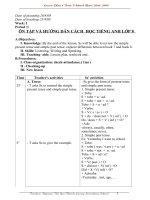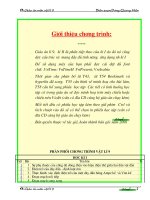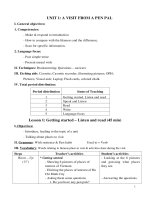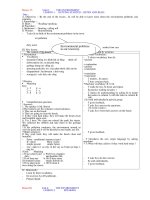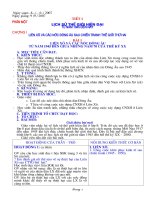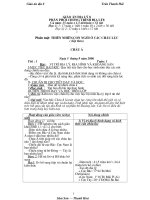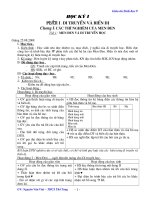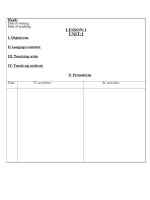Giao an anh 9 ki 2
Bạn đang xem bản rút gọn của tài liệu. Xem và tải ngay bản đầy đủ của tài liệu tại đây (61.02 KB, 7 trang )
Period 37: Unit 6: The environment
Lesson 1: Getting started - Listen and read
Date :
A. Objectives :- By the end of the lesson , Ss will be able to know more about the environment problems and
solutions.
I. Knowledge :-
II. Skills : - Reading/ speaking
B. Procedure :
I. Settlement : - Greeting, calling roll
II. Warmer : - Brainstorming
- T asks Ss to think of the environment problems in the town.
air pollution
dirty street
smoke from cars
III. New lesson :
The content of the lesson Teacher's and Ss' activities
1.Presentation :
Vocabulary :
- dynamite fishing (n) :đánh bắt cá bằng thuốc nổ
- deforestation (n) :sự tàn phá rừng
- garbage dump (n) :đống rác
- spraying pesticides (n) :việc phun thuốc diệt sâu bọ
- disappointed ( by/about/at ) :thất vọng
- sewage(n) : nớc thải, nớc cống
2.Practice
Matching
Key:
1 - f 4 - a
2 - e 5 - c
3 - b 6 - d
Comprehension questions
*Answers:
1. The speaker is Mr. Brown
2.The listeners are the volunteer conservationists.
3. They are on the beach.
4. They are going to clean the beach.
5. If they work hard today, they will make the beach clean
and beautiful again soon.
6. Yes, I have. We clean our school/ the park/ the streets.
We collected the rubbish and take them to the garbage
dump.
7.If the pollution continues, the environment around us
won't be good and it will be harmful to our health, our life.
*Model sentences:
If they work hard, they will make the beach clean and
beautiful.
- Form : conditional sentences type 1
If- clause Main- clause
simple present simple future
- Use : diễn tả 1 sự việc có thể xảy ra ở hiện tại hoặc t-
ơng lai.
*Drill: Matching
1.If our school yard a. We'll live a happier
dirty, and healthier life.
2.If we keep our b. We'll have more
environment clean shades &fresh air.
*Pre- teach vocabulary :
- T elicits vocabulary from Ss
+ picture
+ explanation
+ picture
+ translation
+ translation
+ translation
- T models , Ss repeat .
- T does concept check.
*Checking vocabulary: R. O. R.
- T reads the text, Ss listen and repeat.
- Ss practice reading.(in pairs )
- T checks Ss' understanding by asking Ss to match
the names in column A with the tasks in column B.
(48)
( Ss work individually/in pairs/in group
- T gives feedback.
- T asks Ss to answer the questions.
( Ss work in pairs )
- T asks Ss to write their answers on the board.
- T gives feedback.
- T introduces the new target language by asking
questions.
+ T: What will they achieve if they work hard today ?
- T asks Ss to do the exercise
- Ss work individually.
- T gives feedback.
Environmental problems
in our town/city.
3.If we plant more c. We'll clean it.
trees along the streets
IV. Homework :
- Learn by heart vocabulary.
- Do exercise 8 p.45(workbook)
- Prepare Speak.
Period 38: Unit 6: The environment
Lesson 2: Speaking
Date: Jan.19th, 06
A. Objectives: - By the end of the lesson, Ss will be able to persuade their friends to protect the environment.
I. Knowledge: - Practice speaking (to persuade people to protect the environment)
II. Skills: - Speaking
B. Procedure:
I. Settlement: - Greeting, calling roll
II. Warmer: - Slap the board
III.
New
lesson :
The content of the lesson Teacher 's and Ss' activities
1. Pre- speaking:
• Vocabulary:
- (to)dissolve :
- exhaust fume(n) :
- (to) do harm ( adj ) :
*Form :
- I think you should..........
- Won't you......................
- Why don't you ............... + Inf .
- Why not..........................
- It would be better if you.......
- What/ how about + V - ing ?
*Use :- Dïng ®Ó thuyÕt phôc mét ngêi nµo ®ã lµm g×..
Ex :
- T : I think you should use banana leaves to wrap
food.
- Ss: Why?
- T : Because plastic bags are very hard to dissolve,
they will cause pollution.
2. While- speaking :
(P. 49)
3. Post- speaking :
• Pre- teach vocabulary
- T elicits vocabulary from Ss
+explanation
+picture .
+ translation
- T models, Ss repeat
- T does concept check.
• Checking vocabulary: R.O.R.
- T elicits the new target language from Ss.
- T asks Ss to look at exercise in their books (P.49)
and models.
- T asks Ss to practise speaking
( Ss work in pairs )
- T corrects Ss' mistakes.
- T asks Ss to discuss the question: "What do you do to
protect the environment ?"
- Ss work in groups
+ Group 1: save paper
+ Group 2 : reduce water pollution
produce
deforestati
on
preven
t
dynamite
pollution
garbage
+ Group 3 : reduce air pollution
+ Group 4 : reduce garbage
IV. Homework :
- Learn by heart vocabulary.
- Write a short paragraph about what you often do to protect the environment.
- Prepare Listen.
Period 39: Unit 6: The environment
Lesson 3: Listening
Date :Jan. ,06
A. Objectives :- By the end of the lesson , Ss will be able to listen for details to complete the notes.
I. Knowledge :- Practice listening to the report on how our oceans are polluted.
II. Skills : - Listening
B. Procedure :
I. Settlement : - Greeting, calling roll
II. Warmer : - Jumbled words
plutedo = polluted
nocea = ocea
raagbeg = garbage
cicedneta = accident
phip = ship
essvel = vessel
- T introduces the new lesson
III.New lesson :
The content of the lesson Teacher's and ss' activities
1. Pre- listening :
*Vocabulary :
- sewage (n ):níc th¶i
- pump (v ):
- deliberate(adj ):
- (to) leak :
- oil spill ( n ) :
• Brainstorming :
oil spill
2.
While-
listening :
• Pre- teach vocabulary :
- T elicits vocabulary from Ss
+ ( explanation )
+ (mime )
+ ( translation )
+ ( translation )
+ (picture )
- T models, Ss repeat
- T does concept check.
* Checking vocabulary :What and where
- T asks Ss to think of the question :How is the ocean
polluted ?
- (Ss work individually )
- T asks Ss write their answers on the board.
- T asks Ss to listen to the tape and check their
answers.
How is the ocean
polluted ?
*Gap- fill :(P .50 )
Keys :
- ......dropped into the sea
- ......come from ships at sea
- Waste materials from factories.
- Oil is washed from land
3. Post- listening :
Discussion
• Tape transcript :
“Our oceans are becoming extremely polluted. Most of
this pollution comes from the land, which means it comes
from people. First, there is raw sewage, which is pumped
directly into sea. Many countries, both developed and
developing are guilty of doing this. Secondly, ships drop
about 6 million tons of garbage into the sea each year.
Thirdly, there are oil spills from ships. A ship has an
accident and oil leaks from the vessel. This not only
pollutes the water, but it also kills marine life. Next, there
are waste materials, from factory owners let the waste run
directly into the rivers, which then leads to the sea. And
finally, oil is washed from land. This can be the result of
carelessness or a deliberate dumping of waste."
- Then T gives feedback.
- T asks Ss to listen to the tape and fill in the blanks.
( Ss work individually / in pairs )
- T gives feedback.
- T asks Ss to discuss the question:
“What do you do to prevent the ocean from pollution?”
+ (Ss work in groups, then some Ss talk in front of
class )
- T gives Ss the tape transcript and asks Ss to listen to
the tape again.
IV. Homework :
- Learn by heart vocabulary.
- Practice reading the text.
- Prepare Read.
Period 39 : Unit 6: The environment
Lesson 4: Read
Date:
A. Objectives: - By the end of the lesson, Ss will be able to understand a poem.
I. Knowledge: - Practice reading a poem about the environment.
II. Skills: - Reading/Speaking
B. Procedure:
I. Settlement: - Greeting, calling roll
II. Warmer: - Chatting
Do you like poetry?
Do you think it is easy to understand a poem?
Have you ever read an English poem?
..................................
III. New lesson :
The content the of lesson Teacher's and Ss' activities
1.Pre- reading :
*Vocabulary :
- junk- yard (n ):b·i phÕ th¶i
- treasure (n) : ch©u b¸u
- foam (n) : bät
- folk (n) : ngêi,
- hedge (n) : hµng rµo
- stream (n) : dßng suèi
*Pre- questions :
a. Who does the poet talk to in the poem?
b. What is the poem about?
2.While- reading :
Key :
a.The mother and her son.
b. The poem is about the environment.
• Comprehension questions :
1. If the pollution goes on, the world will end up like a
second hand junk yard.
2. The mother thinks other folk pollute (are responsible
for the pollution of) the environment but not her or her
son.
3. His mother will take him home right away.
4. No. Because he is right; if he throws the bottles that
will be polluting the woods.
5. The poem wants us to learn that everyone is
responsible for keeping the environment from pollution.
3. Post- reading :
Discussion
*Pre- teach vocabulary :
- T elicits vocabulary from Ss.
+ ( explanation )
+ ( realia )
+ ( picture )
+ ( explanation )
+ ( picture )
+( picture )
- T models, Ss repeat.
- T does concept check.
• Checking vocabulary : Matching
( P 51 )
- T sets the scene
- T gives two questions and asks Ss to think of them
(Ss work individually.)
- T asks Ss to read the poem and answer two questions
( Ss work individually )
- T gives feedback.
- Then T asks Ss to read the poem carefully and
answer the questions on page 51.
( Ss work individually /work in pairs )
- Some Ss write their answers on the board.
- T gives feedback.
- T asks Ss to discuss the question "What could you do
in your school / house to minimize pollution?”
( Ss work in groups )
- Ss write their ideas on the posters and T gives
feedback.
IV. Homework :
- Learn by heart vocabulary.
- Write 5 things that you have to do to keep the environment unpolluted.
- Prepare Write.
Period 40: Unit 6: The environment
Lesson 5: Write
Date:
A. Objectives: - By the end of the lesson, Ss will be able to write a complaint letter.
I. Knowledge: - Practice writing a letter of complaint.
II. Skills: -Writing
B. Procedure:
I. Settlement: - Greeting, calling roll
II. Warmer : - Categories
- T asks Ss to find out the verbs beginning with the letters that teacher gives.
- Ex : A : add
S: study
...... (Ss play the game in groups)...
- T introduced the new lesson.
III. New lesson :
The content of the lesson Teacher's and Ss' activities
1.Pre- writing:
*Vocabulary :
- (to) complain :phµn nµn
- (to) float :tr«i, næi bång bÒnh
• Pre- teach vocabulary :
- T elicits vocabulary from Ss.
+ ( translation )
+ ( translation )
